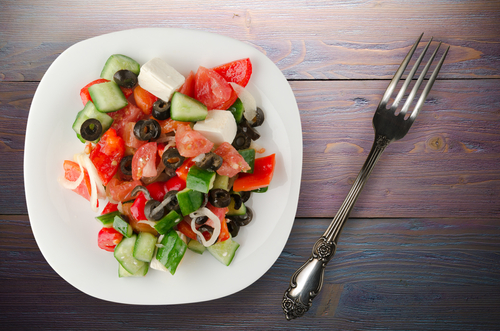As we begin a New Year, “eating healthier” is always a common resolution. A change in diet may be good for more than just your body, as recent studies continue to point to the benefits of an active, heart-healthy lifestyle to help keep the mind sharp and alert.
While there is no specific diet for our loved ones already living with Alzheimer’s disease, good nutrition can ease some symptoms and improve their health and wellness. Diets have not been proven as an effective treatment to address symptoms of Alzheimer’s; however, incorporating heart healthy eating patterns may help protect the brain.
- The Mediterranean Diet includes relatively little red meat and emphasizes whole grains, fruits and vegetables, fish and shellfish, and nuts, olive oil and other healthy fats. This way of eating is not only good for your heart, but for brain health as well. Doctors found that seniors who eat plenty of fruits, vegetables, legumes, cereals, olive oil, and fish; moderate amounts of wine; and little red meat or high-fat dairy products see great results.
- In addition, according to the Alzheimer’s Association, berries and dark-skinned fruits (which are rich in antioxidants) are some beneficial fruits which should be incorporated into your loved one’s diet. Fruits such as blueberries, blackberries, strawberries, raspberries, plums, oranges, red grapes and cherries are good examples of these types of fruits.
- Further, drinking juice has also been proven to have great benefits. Fruit and vegetable juices are recommended, and researchers point to disease-fighting substances called polyphenols that are naturally found in fruits and vegetables as a possible source of mind-health.
Here are some other simple ways you can make eating healthier, easier, and more enjoyable:
The Basics: Build A Meal Plan To Help Your Loved One
- Eat a variety of foods, especially fruits and vegetables, whole grains, lean protein, and low-fat dairy
- Keep a healthy weight. Proper portion sizes and exercise are a key part of weight control
- Limit foods with high saturated fat and cholesterol, like fatty meats and fried foods
- Cut down on sugar
- Avoid eating too much salt
- Drink plenty of water
Weight Maintenance
When living with Alzheimer’s, your loved one may feel less hungry or thirsty, have problems chewing or swallowing, or may have trouble using utensils or feeding themselves. This raises the chance that they won’t eat enough and will lose too much weight.
In order to help your loved one keep a healthy weight maintained, you can incorporating tips such as:
- Offer smaller meals or snacks more often. Eating five or six times a day may be easier than getting the same amount of food in three meals
- Ensure they are taking a daily multivitamin
- Prepare things that are easy to eat, such as bite-sized finger foods that do not require utensils
- Trouble chewing or swallowing could be a choking risk, so talk to your loved one’s medial team or dietician who can recommend foods that are easier to eat
- Exercise can boost appetite; taking into consideration physical limitations, you can encourage your loved one to take walks or do simple chores to stay active
The MIND Diet
For caregivers and families of those living with Alzheimer’s, a healthy diet can be beneficial for protecting your own heart and mind health. In fact, many recent studies have shown that the MIND diet may reduce the risk of developing Alzheimer’s disease by as much as 53 percent. While there are many factors (including genetics and heredity) that we can’t control, the MIND diet plan is recommended for everyone in helping reduce the risk factors associated with developing Alzheimer’s disease down the road.
The MIND diet stands for Mediterranean-DASH Intervention for Neurodegenerative Delay. This diet combines the elements of two other popular nutrition plans which have been proven to benefit heart health: the Mediterranean diet and the DASH (Dietary Approaches to Stop Hypertension) diet. The MIND diet has been shown to very effective, and it breaks its recommendations down into 10 “brain healthy food groups” a person should eat and five “unhealthy food groups” to avoid.
“Brain Healthy Food Groups”
- Green leafy vegetables: Kale, spinach, broccoli, collards and other greens are packed with vitamins A and C and other nutrients. At least two servings a week can help, and researchers found six or more servings a week provide the greatest brain benefits.
- Nuts: Nuts are shown to have huge benefits and are a good snack for brain health, according to the MIND diet study. Nuts contain healthy fats, fiber and antioxidants, and other studies have found they can help lower bad cholesterol and reduce the risk of heart disease.
- Beans: High in fiber and protein, and low in calories and fat, beans also help keep your mind sharp as part of the MIND diet.
- Whole grains: Proven to be a key component of the MIND diet.
- Fish: one serving of fish per week was shown to help protect brain function.
- Poultry: another part of a brain-healthy eating plan, it is recommended to have two or more servings a week of lean poultry.
- Olive oil: researchers found people who used olive oil as their primary oil at home saw greater protection against cognitive decline.
- Wine: One glass of wine per day rounds out the list of of 10 “brain healthy” food groups.
“Non-Beneficial Food Groups” (foods to avoid to aid in reducing your risk of developing Alzheimer’s or dementia)
- Red meat: while it doesn’t need to be eliminated entirely, researchers say you should limit consumption to no more than four servings a week to help protect brain health.
- Butter and margarine: limit these items to less than a tablespoon per day (brain-healthy olive oil is recommended as a replacement.)
- Cheese: cheese should be limited drastically to no more than one serving per week.
- Pastries and other sweets: The MIND diet recommends limiting yourself to no more than five of these treats per week, as they can have a negative effect on brain health
- Fried foods and fast food: limit your indulgence in fried food to no more than once a week for optimal heart and brain health.
Even modest adherence to the MIND diet measurably reduced a person’s chances of developing Alzheimer’s disease, and the longer you stick with it, the greater the benefits. Not to mention, you’ll be healthier overall which aids in preventing many diseases we face as we grow older.





